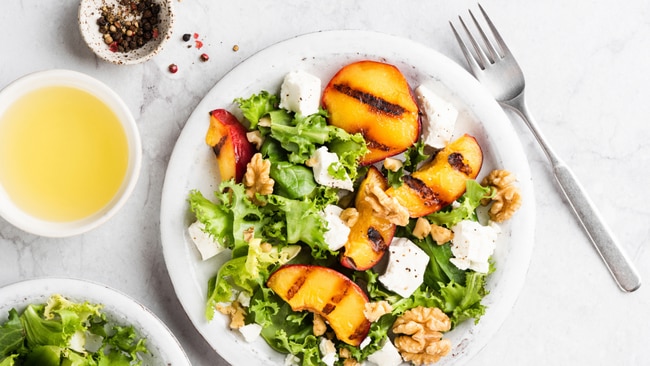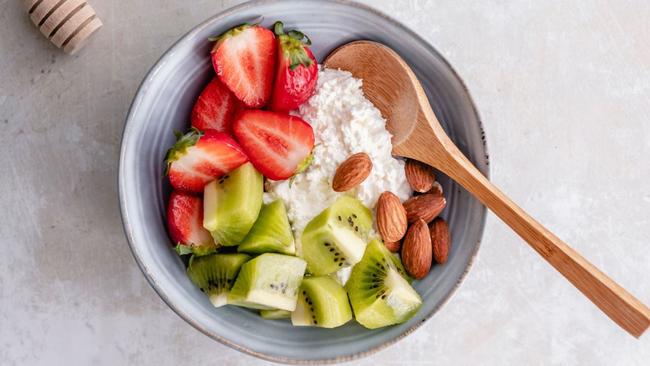The best foods to eat once you hit menopause
And the ones to avoid

Menopause
Don't miss out on the headlines from Menopause. Followed categories will be added to My News.
By making some small tweaks to your diet, you can help manage the common symptoms of menopause, explains accredited nutritionist Faye James.
Menopause is a significant period in a woman's life, marked by hormonal shifts and a decline in estrogen levels.
This natural transition can bring about a variety of challenging symptoms such as hot flashes, headaches, anxiety, sleep disturbances, irritability, and joint pain. Moreover, menopause can negatively impact bone, heart, and brain health.
Despite these challenges, making simple dietary adjustments can help ease the menopausal transition. By focusing on a wholesome, anti-inflammatory diet, women can mitigate stress and alleviate menopausal symptoms.
Like what you see? Sign up to our bodyandsoul.com.au newsletter for more stories like this.
A Mediterranean-style diet, rich in fruits, vegetables, pulses, whole grains, olive oil, nuts, seeds, and fish, has been shown to reduce inflammation - a precursor to chronic diseases and autoimmune conditions.
Studies have demonstrated the effectiveness of this diet in reducing weight gain, heart disease risk, and menopausal symptoms.
Here are some straightforward adjustments you can make to your daily habits to enhance your health, facilitate weight loss, boost energy levels, and promote longevity during menopause:

1. Consume sufficient protein
Aim for 1-1.2g of protein per kg of body weight daily to combat muscle loss. Incorporate protein sources like Greek yoghurt, salmon, and beans on wholegrain toast.
2. Monitor carbohydrate intake
Limit refined and processed carbs, which can contribute to excess belly fat. Research suggests that a reduced-carbohydrate diet can decrease weight gain risk during menopause.
3. Keep track of calorie intake
Aim for a daily caloric intake between 1,000 and 1,800, depending on your height, weight, and activity levels. Eating three balanced meals daily, starting with a protein-rich breakfast and ending with a light supper, can support weight management.
4. Intermittent fasting
Consider adopting an 8-12 hour daily eating window followed by a fasting period. Consult your doctor before starting intermittent fasting to ensure it's safe for your health.

5. Avoid processed foods
Steer clear of high-sodium, high-sugar snacks that can cause bloating and water retention. Opt for healthier alternatives like carrots with hummus or seeded crackers with peanut butter.
6. Limit spicy foods
Spicy foods can trigger hot flashes and sweating. Use mild spices such as basil, cumin, coriander, and turmeric to flavour your meals.
7. Say no to fast food
Fast food is often high in unhealthy fats that raise heart disease risk. Choose healthier options like grilled chicken sandwiches on wholegrain buns or prepare healthy meals at home.
8. Drink alcohol in moderation
Heavy drinking increases the risk of breast cancer and cardiovascular disease and can trigger hot flashes. Limit yourself to one drink or less per day.

9. Reduce caffeine intake
Caffeine can exacerbate hot flashes. Opt for caffeine-free drinks like ginger or peppermint tea, or engage in physical activities for an energy boost.
10. Choose lean meats:
Fatty meats can lower serotonin levels, leading to irritability. Select leaner cuts of meat like chicken, turkey, or 90 per cent lean ground beef.
Incorporating these simple changes into your daily routine can significantly improve your overall health and well-being during menopause. Embrace a balanced, nutrient-dense diet to ease the menopausal transition and enhance your long-term health.
The Menopause Diet, Recipes to reset the body and blast body fat is available for pre-order on Booktopia and Amazon. It hits all major bookstores on June 20.
Faye James is an accredited nutritionist, a member of Nutrition Council Australia, an associate member of the Australian Menopause Society, and the author of cookbooks The Menopause Diet (2023) The 10:10 Diet (2019) and The Long Life Plan (2018). Follow her on Instagram here.
Originally published as The best foods to eat once you hit menopause



